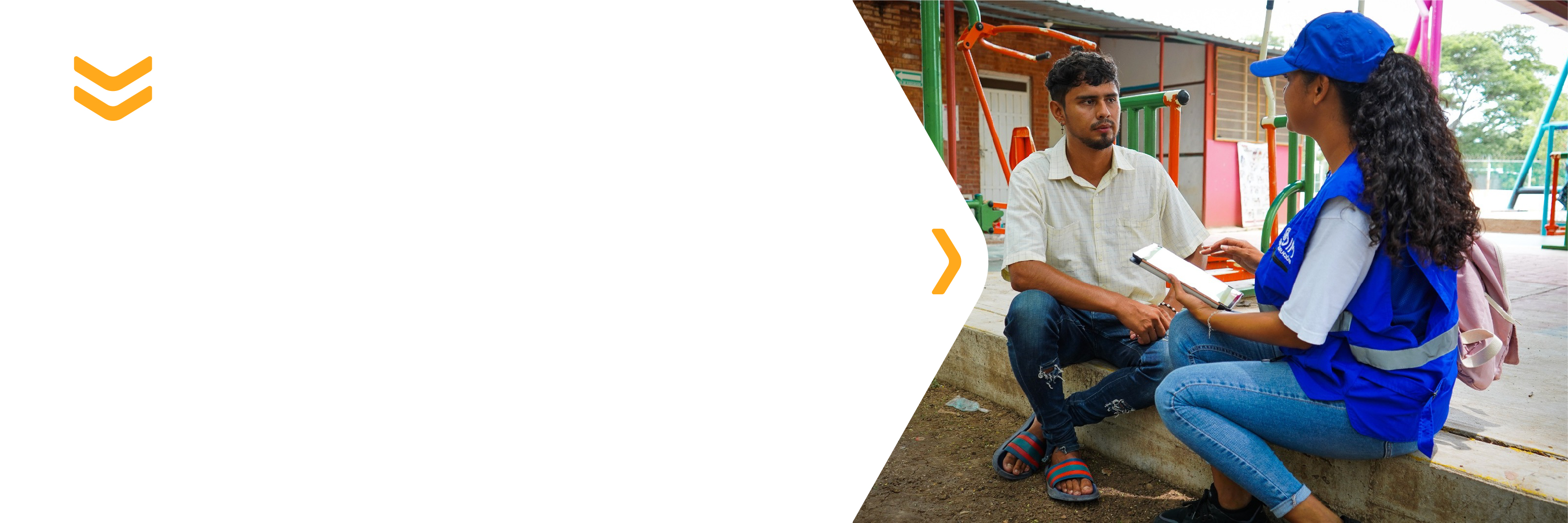The management of migration data contributes to evidence-based decision making through research, knowledge generation and the production of timely, high quality analytical reports, infographics and maps. It informs the Western Hemisphere Program on migratory trends, migrant’s characteristics and vulnerabilities, and contributes to the development of data-driven solutions for an improved, humane and human rights-based migration governance.
The documents in this section contain updated migration data in the region.
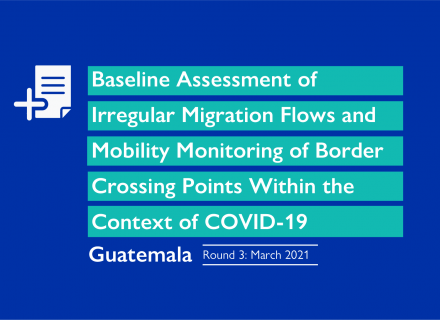
Guatemala-Baseline Assessment Of Migration Flows And Migrants Presence Within The Context Of COVID-19 Report- #3 (March, 2021))
Data were collected through interviews conducted remotely with strategically selected key informants. Estimates were received from the Red Cross, the Human Rights Ombudsman’s Oce, the Support Committee for Migrants, Refugees, and Tracking Victims, the Izabal Department Government, the United Nations High Commissioner for Refugees (UNHCR), the Municipality of Libertad, the National Migrant Services Council, the Labor Ministry’s Department of Labor Mobility, and the Social Welfare Secretariat. The interviews were held in April 2021.
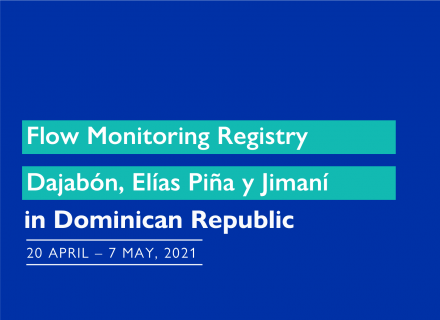
Flow monitoring registry. Dajabón, Elías Piña, Jimaní. Round 1, April-May 2021.
The data for this report were collected under the flow monitoring subcomponent of the Displacement Tracking Matrix (DTM) methodology, with the objective of generating a preliminary impression of the characteristics of migrants, migration dynamics and the mobility of migrants at three border crossings.
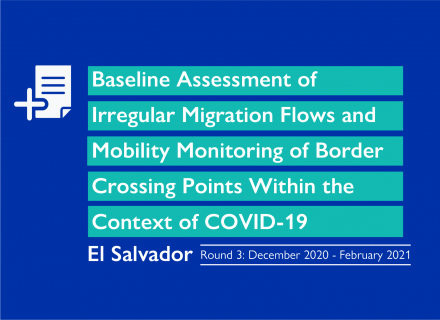
El Salvador-Baseline Assesment Of Migration Flows And Mobility Tracking Within The Context Of COVID-19, #3 (December 2020-February 2021)
The social and economic context in El Salvador has been affected by the COVID-19 pandemic. To enter El Salvador, individuals must present certification of vaccination against COVID-19. The need to obtain a negative PCR-RT test in order to cross the different borders has been added to the other necessary requirements and has increased the cost of regular migration, with tests costing approximately $120 to $140. In addition, cases of scams involving false PCR-RT tests have been detected, resulting in many migrants being returned or rejected when trying to enter Salvadoran territory. This report used key informant methodology to characterize migration flows in El Salvador between December 2020 and February 2021.
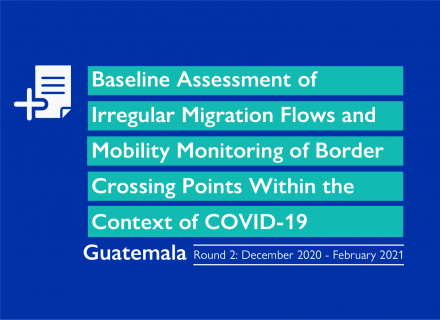
Guatemala-Baseline Assessment Of Migration Flows And Migrants Presence Within The Context Of COVID-19 Report- #2 (December, 2020-February 2021)
The social and economic context in Honduras has been affected by the consequences of the COVID-19 pandemic. This report used the key informant methodology to characterize migrant flows in Honduras, between December 2020 and February 2021.
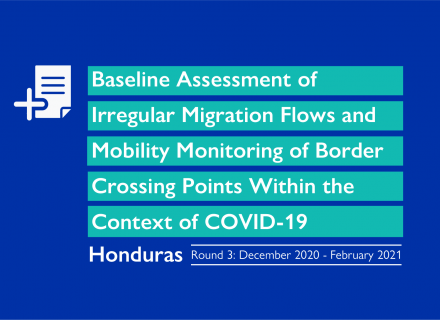
Honduras-Baseline Assessment Of Migration Flows And Mobiity Tracking Within The Context Of COVID-19 Report #2 (September-November, 2020)
The social and economic context in Honduras has been affected by the consequences of the COVID-19 pandemic and the Eta and Iota hurricanes. This report used the key informant methodology to characterize migrant flows in Honduras, between December 2020 and February 2021.
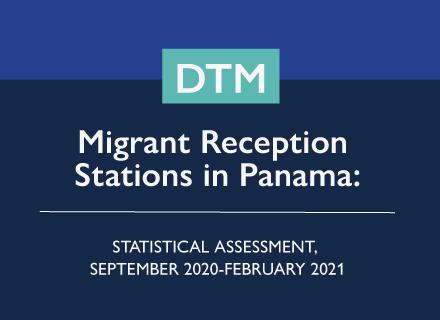
Panama- Emergency Tracking: Migratory Receiving Stations-COVID 19 Pandemic: Statistical Assessment, September 2020-February 2021
On March 20, 2020, Panamanian authorities declared the health emergency because of COVID-19 in the country. Between March 16, 2020 and January 29, 2021, land borders remained closed to prevent the spread of COVID-19, therefore greatly affecting the Controlled Flow Operation, an agreement previously reaches between Panama and Costa Rica to promote safe, orderly and regular migration. This report gathers statistical information about population lodged at migratory reception stations between September 2020 and February 2021.
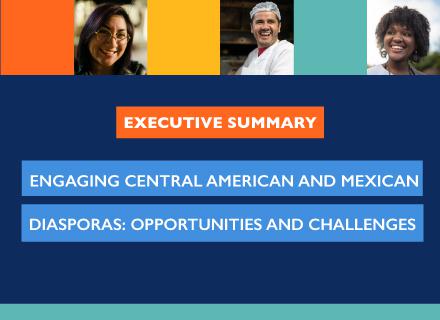
Executive summary: Engaging Central American and Mexican Diasporas. Opportunities and Challenges
Discover the main findings of a pioneer IOM study that, building from an exhaustive research of more than 1000 diaspora organizations in Canada, the United States, Mexico and Central America, has gathered information on more than 100 of them and started an interactiva map on the iDiaspora platform.
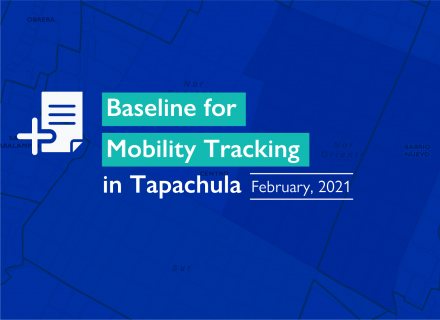
Mexico-Baseline For Mobility Tracking: Presence Of Migrants, Tapachula, Chiapas #1, (February 2021)
Currently, a large number of migrants have had to remain in the municipality of Tapachula, mainly in urban areas, waiting for the resolution of the National Institute of Migration (INM) on their migration status or waiting for the resolution of the Mexican Commission for Refugee Assistance (COMAR) on their request for refugee status in the country. IOM conducted a data collection under the DTM methodology, in order to generate information on the presence of migrants in Tapachula, to generate profiles of the migrant population with emphasis on integration and labor migration.
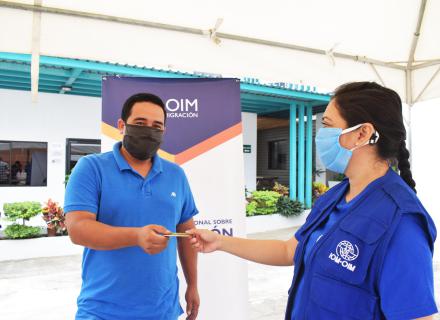
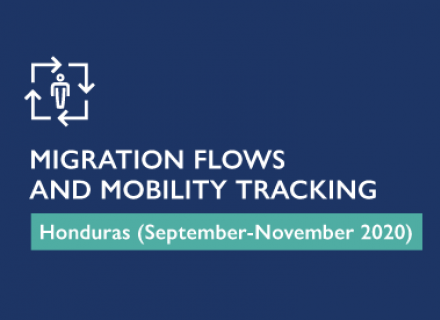
Honduras-Baseline Assessment Of Migration Flows And Mobiity Tracking Within The Context Of COVID-19 Report #2 (September-November, 2020)
Due to the emergencies generated by the COVID-19 pandemic and the Eta and Iota hurricanes, IOM decided to investigate about the impact on mobility and irregular migration flows, especially on the people who have been stranded on the Honduran borders. The study aimed to generate a baseline to understand the existing needs in official and non-official entry points, to get inputs that might direct future actions by protection organizations.

